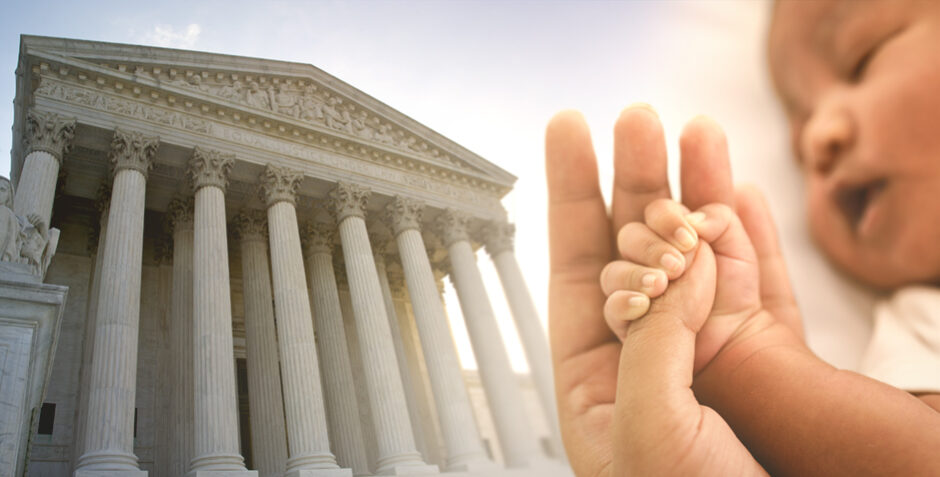ACLJ Files Amicus Brief in Dobbs Supreme Court Abortion Case on Behalf of Pro-Life Medical Research Institute: Abortion More Dangerous Than Childbirth
We said it before, and we’ll say it again: Abortion is not safer than childbirth. Of course, that’s not the key issue regarding abortion. As we noted earlier:
Killing babies before birth in abortion, like killing them after birth in infanticide, is wrong even if someone could show the killing would bring health benefits for adults. And for those who think abortion is an essential right, it probably doesn’t matter much whether abortion is good or bad for women’s health. Nevertheless, the U.S. Supreme Court has relied in part upon the supposed safety of abortion in structuring its abortion jurisprudence. The ACLJ has therefore undertaken to challenge – and explode – the claim of abortion apologists that abortion is very safe, even safer than childbirth.
In the new Supreme Court abortion case of Dobbs v. Jackson Women’s Health Organization, we have now refuted the claim that abortion is safe for the fourth time in an amicus brief to the Court. (For reports on our prior filings, see here, here, and here.) This time around we had the privilege of filing the brief on behalf of the Elliot Institute, one of the premier organizations researching abortion safety.
The Dobbs case (which we have discussed previously here and here) represents an especially important opportunity to make this argument, as the state of Mississippi, whose abortion law is at issue, has directly asked the Supreme Court to overrule Roe v. Wade, the 1973 decision that invented a right to abortion out of thin air. Defenders of abortion insist that abortion is somehow crucial to women’s health (except they also argue a woman should be able to get an abortion regardless of any health concerns), among other reasons, because the alternative – childbirth – is so risky. In the Dobbs case, the abortionists actually claim that in Mississippi, childbirth is sixty-four (64) times more lethal to mothers than abortion!
Nonsense. Absolute nonsense.
We dissect the abortion safety claim with three main sections in our brief for the Elliot Institute.
First, if abortion is so safe, why are there so many ambulances called to abortion facilities? The Appendix to our brief contains eighty-one single-spaced pages of reports of ambulances arriving at abortion centers across the nation from 2009 to 2021. And those are just the ones we know about. As we explain:
This list is just the tip of the iceberg. There is no systematic reporting of abortion complications or ambulance calls to public health officials. The news media do not generally report on medical emergencies at abortion facilities. Reports of such occurrences therefore are almost exclusively done by pro-life investigators or sidewalk counselors who witness and report an incident.
Moreover:
[N]ot all serious complications after abortion manifest themselves quickly enough to result in ambulance transport from the abortion facility itself. Indeed, the abortion providers [themselves] insist[] that “in respect to surgical abortion patients who do suffer complications requiring hospitalization, most of these complications occur in the days after the abortion, not on the spot”. The abortion providers . . . went so far as to characterize it as a “universal fact” that “complications are most likely to occur after the patient has left the clinic.”
Second, the claim that abortion is safer than childbirth rests on an embarrassingly faulty data comparison. The abortion defenders simply compare (a) the rate of reported abortion deaths per abortion procedure with (b) the “pregnancy mortality rate” of maternal deaths divided by live births. Sounds sensible, right? Not when you look closer. As we explain:
- Abortion deaths are grossly underreported
- Delayed abortion deaths are not counted
- The pregnancy death totals include abortion deaths, thus stacking the comparison against childbirth
- The pregnancy death rate does not include the many pregnancies that do not result in live birth, further stacking the comparison against pregnancy
- The pregnancy death rate does not reflect the stage of gestation, making the rates useless for comparison to an abortion at the same stage of pregnancy
Consider just one of these points:
[W]hen a woman dies from abortion, that death counts both as an abortion mortality and as a pregnancy mortality. With such an approach, the results are mathematically stacked against childbirth ever being deemed safer than abortion. Consider: even if every single woman in a single year who had an abortion died from the procedure, and only one woman that year died from a miscarriage or complication of childbirth, the total number of deaths in the “pregnancy mortality” category for that year would still exceed the total deaths in the “abortion mortality” category. This makes comparison of the two figures positively absurd.
Third, the published studies that actually do compare maternal outcomes after abortion and childbirth show, contrary to the abortion proponents’ claims, that abortion is demonstrably more likely to injure and kill the woman. We therefore conclude:
There is now ample reason to believe that abortion is detrimental to maternal health and, if anything, more likely to lead to death or other adverse consequences for the pregnant woman than is continuing the pregnancy.
Abortion is no boon to women, much less to their children in the womb. We hope the Supreme Court gets the message loud and clear and repudiates, at last, the abortion regime the Court imposed in Roe v. Wade.
This brief, on behalf of the Elliot Institute, is one of three amicus briefs filed by the ACLJ’s litigation team at the Supreme Court in this case. We also filed a brief on behalf of ourselves and our members, which we will discuss separately, and a brief on behalf of our international affiliate, the European Centre for Law and Justice (ECLJ), discussed here, that addresses how much more restrictive of abortion and protective of unborn humans European law is.
